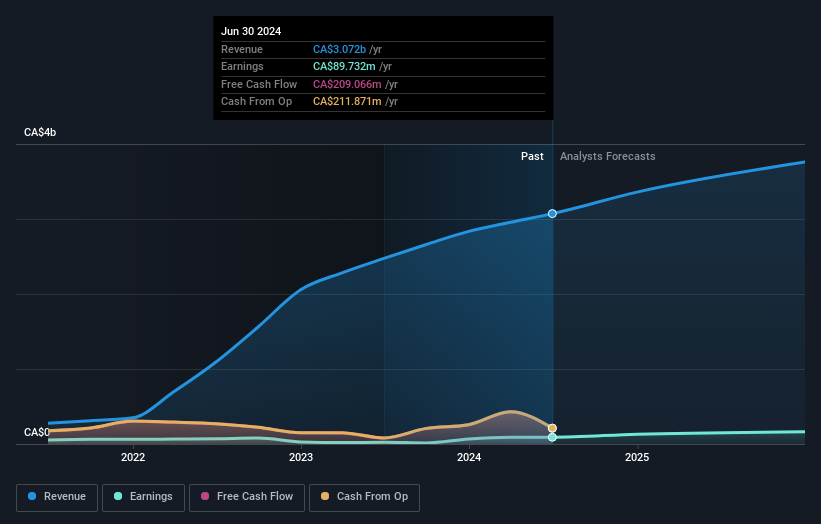Trisura Group Ltd.'s (TSE:TSU) market cap dropped CA$81m last week; individual investors who hold 59% were hit as were institutions

Key Insights
- The considerable ownership by retail investors in Trisura Group indicates that they collectively have a greater say in management and business strategy
- A total of 25 investors have a majority stake in the company with 38% ownership
- Insiders have sold recently
To get a sense of who is truly in control of Trisura Group Ltd. (TSE:TSU), it is important to understand the ownership structure of the business. With 59% stake, retail investors possess the maximum shares in the company. That is, the group stands to benefit the most if the stock rises (or lose the most if there is a downturn).
While institutions, who own 39% shares weren’t spared from last week’s CA$81m market cap drop, retail investors as a group suffered the maximum losses
Let's delve deeper into each type of owner of Trisura Group, beginning with the chart below.
Check out our latest analysis for Trisura Group

What Does The Institutional Ownership Tell Us About Trisura Group?
Many institutions measure their performance against an index that approximates the local market. So they usually pay more attention to companies that are included in major indices.
We can see that Trisura Group does have institutional investors; and they hold a good portion of the company's stock. This implies the analysts working for those institutions have looked at the stock and they like it. But just like anyone else, they could be wrong. If multiple institutions change their view on a stock at the same time, you could see the share price drop fast. It's therefore worth looking at Trisura Group's earnings history below. Of course, the future is what really matters.

Trisura Group is not owned by hedge funds. The company's largest shareholder is CI Global Asset Management, with ownership of 7.3%. For context, the second largest shareholder holds about 4.4% of the shares outstanding, followed by an ownership of 4.1% by the third-largest shareholder.
On studying our ownership data, we found that 25 of the top shareholders collectively own less than 50% of the share register, implying that no single individual has a majority interest.
Researching institutional ownership is a good way to gauge and filter a stock's expected performance. The same can be achieved by studying analyst sentiments. There are a reasonable number of analysts covering the stock, so it might be useful to find out their aggregate view on the future.
Insider Ownership Of Trisura Group
The definition of an insider can differ slightly between different countries, but members of the board of directors always count. The company management answer to the board and the latter should represent the interests of shareholders. Notably, sometimes top-level managers are on the board themselves.
I generally consider insider ownership to be a good thing. However, on some occasions it makes it more difficult for other shareholders to hold the board accountable for decisions.
Shareholders would probably be interested to learn that insiders own shares in Trisura Group Ltd.. It is a pretty big company, so it is generally a positive to see some potentially meaningful alignment. In this case, they own around CA$35m worth of shares (at current prices). If you would like to explore the question of insider alignment, you can click here to see if insiders have been buying or selling.
General Public Ownership
The general public, who are usually individual investors, hold a substantial 59% stake in Trisura Group, suggesting it is a fairly popular stock. This level of ownership gives investors from the wider public some power to sway key policy decisions such as board composition, executive compensation, and the dividend payout ratio.
Next Steps:
It's always worth thinking about the different groups who own shares in a company. But to understand Trisura Group better, we need to consider many other factors. For instance, we've identified 1 warning sign for Trisura Group that you should be aware of.
But ultimately it is the future, not the past, that will determine how well the owners of this business will do. Therefore we think it advisable to take a look at this free report showing whether analysts are predicting a brighter future.
NB: Figures in this article are calculated using data from the last twelve months, which refer to the 12-month period ending on the last date of the month the financial statement is dated. This may not be consistent with full year annual report figures.
Valuation is complex, but we're here to simplify it.
Discover if Trisura Group might be undervalued or overvalued with our detailed analysis, featuring fair value estimates, potential risks, dividends, insider trades, and its financial condition.
Access Free AnalysisHave feedback on this article? Concerned about the content? Get in touch with us directly. Alternatively, email editorial-team (at) simplywallst.com.
This article by Simply Wall St is general in nature. We provide commentary based on historical data and analyst forecasts only using an unbiased methodology and our articles are not intended to be financial advice. It does not constitute a recommendation to buy or sell any stock, and does not take account of your objectives, or your financial situation. We aim to bring you long-term focused analysis driven by fundamental data. Note that our analysis may not factor in the latest price-sensitive company announcements or qualitative material. Simply Wall St has no position in any stocks mentioned.
About TSX:TSU
Trisura Group
A specialty insurance company, operates in the surety, risk solutions, corporate insurance, and reinsurance businesses in Canada, the United States, and internationally.
Reasonable growth potential with adequate balance sheet.
Similar Companies
Market Insights
Community Narratives


